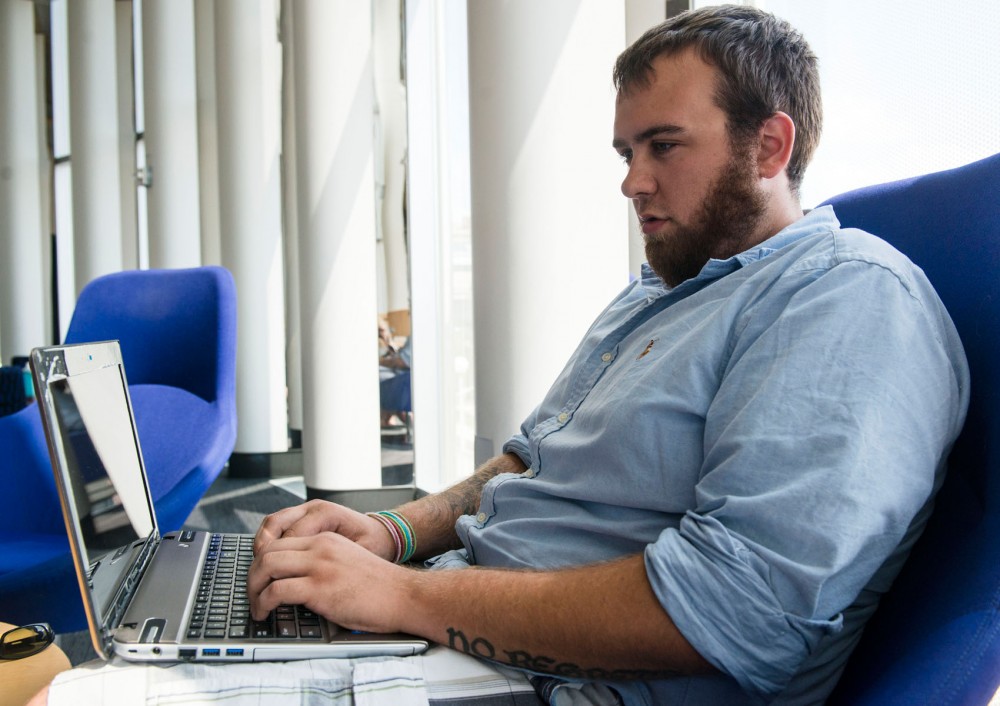When Zach Benson came to the University of Minnesota after serving eight years in the U.S. Army, his high school friends had already graduated or moved away.
The human resources development senior entered the Army directly after high school. Within a month after leaving the service, he was attending Welcome Week at 26 years old.
“After spending eight years … around the world, I came back to Minnesota and pretty much all of my friends were gone,” Benson said. “… Coming to school, and I had to find new friends, that was a little bit of a challenge.”
Besides facing age differences and social barriers, many veterans have health conditions like hearing impairment, joint damage and post-traumatic stress disorder.
The University’s School of Nursing received a $5.3 million grant last month that will allow students to work at the Minneapolis Veterans Affairs Health Care System and learn about treating veterans beginning this fall.
Issues facing student veterans
Benson said his worst injury was a dislocated shoulder, but hearing loss from firing weapons is an issue, too.
“The Fourth of July is always a test of my mental fortitude,” he said. “I hate fireworks.”
Possible psychological damage and recurring knee, ankle and back injuries are also common for veterans, Benson said.
Pamela Reid, a recent animal science graduate who served in the Marine Corps for four years, said the difference in life experience between veterans and other students is obvious.
Benson agreed.
“It’s kind of one of those weird things, where I’ve felt such extreme stress,” he said, “that something like making sure I get papers turned in on time doesn’t stress me out like it does other people.”
Reid also did not enroll in college immediately after high school and said she noticed differences between some traditional students’ and student veterans’ dedication to their education.
“It was kind of difficult to understand other people’s kind of lackadaisical take on attending classes,” she said.
But Benson said adjusting to having free time was his biggest transition.
“I was going from 9 a.m. to 5 p.m. on a rigid schedule … [now] I can wake up five minutes before class, or I can show up two minutes late to class, and no one yells at me,” he said. “It’s this extra freedom that I felt suddenly.”
Much of that free time was spent in Johnston Hall at the Student Veterans Association, a student group that provides support and assistance to veterans and their families.
Benson, the association’s new president, said he got involved with the group his first day on campus and has kept coming back.
“It’s been a good place to go and sit down and talk,” he said. “It’s a good place to complain, where there’s nobody to yell at you for complaining too loudly.”
Because many of the students involved in the group have been deployed, they can talk about situations other students can’t relate to.
“There’s closeness between us from experiences we’ve shared,” said Reed Eichele, the group’s secretary. “We do have our own little support group, a tight little community of friends.”
Caring for veterans
University nursing students will encounter a similar community through the new program at the Minneapolis VA.
Because veterans are exposed to experiences the general public doesn’t face, veterans’ support at the VA is important, said Helen Pearlman, nurse executive at the Minneapolis VA Medical Center .
“There’s a real fellowship that develops when you’re in the armed forces,” she said. “And you can continue that fellowship at the VA.”
Kaylee Wessel, nursing junior, has worked with veterans before and said she looks forward to participating in the program this fall.
“It’s a different experience working with veterans,” she said. “There are different mental health conditions and sometimes multiple conditions they are facing as compared to civilians.”
Pearlman said she hopes that allowing more nursing students to participate in hands-on work at the VA will draw more nursing students to pursue a career working with veterans.
The University was one of six schools chosen for the program, said Christine Mueller, nursing professor and co-writer of the grant.
The University benefits from a stronger curriculum through which students will learn to treat a variety of issues that veterans face, including PTSD and multiple, chronic illnesses in older veterans, Mueller said.
Pearlman said the partnership will benefit the community by bringing more skilled nurses into the VA system.
“That’s good for the veterans,” Pearlman said, “because now we’ll have nurses who are more skilled in care of veterans.”


